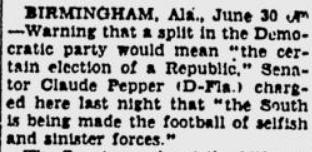
By S. Burton Heath
S. Burton Heath is substituting for Peter Edson, regular conductor of the Washington Column, who is absent from Washington for a few days.
Washington –
Political oratory is tricky stuff. It is designed to sound like a lot but say as little as possible. Its purpose is to enthuse party workers, give slogans to supporters, create doubt and discontent among opponents, and provide a minimum of ammunition for the enemy’s counterattacks.
Speakers at the Republican convention from Keynoter Warren to Governor Dewey followed the pattern. They secreted their nuggets of wisdom carefully in long strings of pretty words. Yet nuggets were there – if not wisdom, at least of information for those who were curious what Candidate Dewey would try to make the issues of the coming campaign.
In sifting the wheat from the chaff, it is helpful to bear in mind that, unlike Alf Landon in 1936, Tom Dewey is not going to let others dictate his strategy and select his issues. There having been no meeting of minds in advance, one should not seek clues to the issues in what was said by Herbert Hoover or Clare Luce or Joe Martin or even by John Bricker, who in the interest of party unity was given the vice-presidential nomination.
Of the speakers in Chicago, three have long been in close accord in their political philosophies. It is safe to say that what Governors Warren and Griswold said comes close to what Mr. Dewey thinks. If you will analyze the speeches, they will fall into two quite dissimilar groups – those of Messrs. Warren, Griswold and Dewey in one, all the rest in another. The first may be assumed to forecast the general tenor of the campaign.
One-man government
If that is so, you won’t hear much about New Deal totalitarianism in terms of European ideology. You will hear a lot about one-man government (New Deal) versus the teamwork that would be substituted by Mr. Dewey.
You will hear a lot about the vigorous, forward-looking mental youth that the GOP wants to substitute for an administration that “has grown tired, complacent and cynical… quarrelsome… decadent” – beset with squabbles among Cabinet members, feuds among department heads, bitterness between the President and his own party leaders – “wrangling, bungling and confusion.”
For this Mr. Dewey will propose to substitute a Cabinet made up of the ablest experts he can find, in the various fields, to whom he will promise to delegate full powers under his general leadership.
You will be told that when 11 million men and women are mustered out of uniform they will want real jobs, not charity or made work. That the nation’s economic history up to the moment war created an artificial prosperity will be cited to demonstrate Mr. Dewey’s contention that northing yet down in 11 years of the New Deal indicated the incumbent administration’s ability to create work and opportunity for the use of individual initiative.
No secrets
The Republicans will seek to keep the war out of the campaign. There will be no question whether we should be in, and fully agreement that we must not only whip Axis armies and navies but wholly destroy the will of the Axis peoples to fight wars.
Insofar as international relations are brought in by the Republicans, it will probably be through accusations that the President is playing power politics, which have failed in the past to preserve peace and, in the opinion of many, have led to war.
The Republicans can be expected to inquire what commitments the President may have made, other than purely military, to Messrs. Churchill and Stalin and Chiang, and to promise that if Mr. Dewey is elected, there won’t be any secrets from the people, and from Congress about what they are being let in for.
These are generalizations, of course. They are like the main topic-headings, in Roman numerals, with which the material is subdivided before even the broad detail is filled in. They are subject to change. But, in the main, you will find them fairly accurate.

